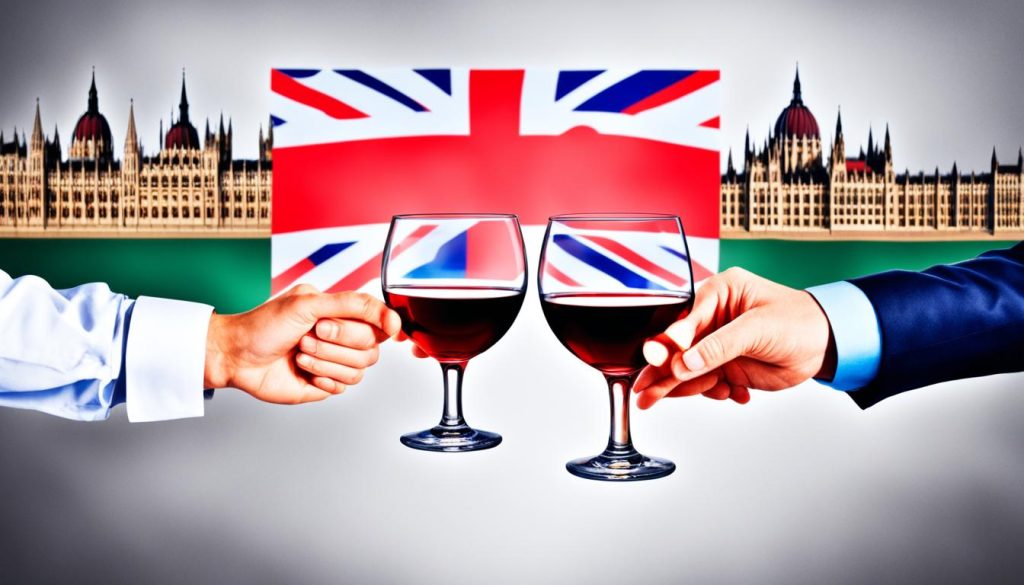Understanding UK-Hungary business relations is crucial for firms entering Eastern and Western Europe markets. Globalisation makes it important to compare cultures for business success in these nations. This article delves into British and Hungarian corporate practices. It highlights differences in business etiquette and cultural impacts in both countries.
Key Takeaways
- Grasp the fundamental differences and similarities in UK and Hungarian business cultures.
- Identify the unique characteristics of British and Hungarian corporate customs.
- Understand the impact of cultural nuances on UK-Hungary business relations.
- Learn how to tactfully navigate cross-cultural comparisons in business practices.
- Explore how economic environments influence corporate strategies in both countries.
An Overview of Business Practices in the UK

Learning how the UK does business is crucial for those wanting to engage in this area. It’s important to know the etiquette, the corporate structure, and how leadership works. This knowledge is key to doing well in the British market.
Business Etiquette in the UK
UK business manners focus on being on time, polite, and well-prepared. A handshake is the usual way to greet in a business setting. Being punctual shows respect. People here speak in a straightforward way, aiming for clarity. It’s also common to send a ‘thank you’ email after meetings to show professionalism.
Corporate Structure and Leadership Styles in the UK
UK companies used to have a strict hierarchy, but now, some prefer a more equal setup. This is especially true in tech and creative fields. Leaders mix formality with a personal approach. They value both teamwork and individual efforts. Even though top managers might make the final choices, they are open to ideas from everyone.
The traditional setup makes roles clear, while equal structures help quick decisions and creativity. Knowing how to work within these structures is important for success in the UK. This applies in all sectors, from finance to making goods.
Hungarian Business Environment Explored

Hungary has been a part of the European Union for a long time. This has mixed traditional Hungarian business ways with Eastern European insights. This mix creates an interesting setting for both local and global businesspeople. Understanding these details is key to Hungary’s open approach to global trade and partnerships.
When dealing with Hungary’s business scene, it’s important to respect local customs and follow regulations closely. Hungarian business values personal trust and politeness over the Western way of doing things alone. This old-school approach to business attracts many, making Eastern European ventures quite appealing.
Here are some key points when working in Hungary:
- Business Formality: Dressing formally and being on time shows your respect in Hungarian business settings.
- Communication Style: A mix of subtle hints and direct negotiations is common here.
- Corporate Structure: It’s important to understand who’s in charge to navigate business dealings smoothly.
These points give crucial advice for anyone wanting to work with Hungary. They help build or strengthen business ties there.
The table below shows how Hungary’s business culture compares to Western Europe’s:
| Aspect | Hungary | Western Europe |
|---|---|---|
| Communication | High-context, nuanced | Low-context, direct |
| Negotiation | Relationship-driven | Deal or fact-focused |
| Corporate Hierarchy | Structured, formal | Often flatter, informal |
| Decision Making | Top-down approach | Collaborative, inclusive |
| Business Meetings | Sequential, agenda-based | Flexible, open-ended |
Hungary’s business culture is more than just rules. It shows a deep cultural heritage. Recognizing these aspects helps in smooth interactions. It can also aid in creating lasting business relationships in this vibrant part of the Eastern European market.
Navigating Cultural Norms: The UK Perspective
In the United Kingdom, traditions and modern values blend in the business world. Knowing the local cultural norms is key for anyone wanting to succeed here. The mix of old and new shows in the strong work-life balance and respect for history.
The Role of Tradition in British Business
British business is deeply rooted in history. This influences how people act in meetings and dress for work. Besides focusing on how things look, there’s a big emphasis on building lasting relationships and being cautious in dealings.
Work-Life Balance in the UK
There’s a growing focus on work-life balance in Britain nowadays. This trend matches a worldwide move but fits well with the UK’s aim to improve worker happiness and productivity. Things like flexi-time, working from home, and support for staff are now common. They help make workers happier and more effective at their jobs.
The Economic Landscape of Hungary

Deep in Central Europe, the Hungarian economy shows a blend of tradition and progress. It keeps growing strong, even with the world’s financial ups and downs. It’s not just about their beautiful buildings and hot springs. Hungary is also a place where businesses worldwide want to invest.
Hungary has lots of talented workers and gets good support from the European Union. This helps the country be creative and good at business. Hungary works hard to be important in Europe’s economy. Now, let’s look at the sectors where investors can find big opportunities:
| Sector | Highlights | Investment potentials |
|---|---|---|
| Automotive | Front-runner in production and export within the EU, compelling innovation. | Robust infrastructure, skilled labour force, and a strong supply chain network. |
| Information Technology | Accelerated growth in software development, IT services, and startups. | High demand for tech solutions and supportive government incentives. |
| Pharmaceuticals | World-class R&D facilities and a heritage of pharmaceutical excellence. | Growth potential in biotechnology and health tech innovations. |
| Agriculture | Strength in traditional crops and emerging organic farming practices. | Opportunities for sustainable agriculture and agri-food technology application. |
| Tourism | Rich cultural experiences and a growing reputation for wellness tourism. | Investment opportunities in boutique hotels and unique tourist attractions. |
Hungary often looks more promising when compared to the UK’s market. The UK has lots to offer too. But Hungary stands out with lower business taxes and a great location for trading in Europe and with Eastern European countries.
Foreign investments help Hungary’s economy grow. The country is good for both old industries and new ones. It’s leading in things like electric cars and renewable energy.
“Hungary’s growth strategy is integrally connected to our ability to attract and nurture investments that not only breed economic prosperity but also foster technological advancement.”
There is hope in Hungary’s real estate and building sectors too. This is thanks to growing cities and important projects. Hungary’s economy looks bright because of these areas. They help make the country a good place for investors from here and other countries.
Knowing about Hungary’s economy helps investors and companies use its benefits. Hungary is on its way to being a strong economy in Europe. It’s a path filled with chances for growth and innovation.
Social Etiquette and Work Culture in Hungary

In the heart of Central Europe, Hungary offers a mix of traditional manners and formal work culture. This can surprise those used to a casual approach in the West. Learning about Hungarian social etiquette and communication is essential. It shows respect and is key for successful work interactions.
Understanding Hungarian Communication Styles
Communication in Hungary balances formality with sincerity. Hungarians are direct but use diplomacy when needed. At first, business talks may be formal. Over time, they become more open and honest as relationships grow. Clear and respectful communication is always important.
Professional Hierarchies and Management in Hungary
In Hungarian companies, there is a clear structure of hierarchy and management. Seniority and position are important in decision-making. Employees are expected to respect and follow their superiors. This creates a workplace where authority is respected.
| Aspect | Description |
|---|---|
| Initial Contact | Use formal titles and surnames until invited to be more informal. |
| Business Meetings | Arrive on time, dress conservatively, and expect a period of small talk before business. |
| Gift Giving | Small, thoughtful gifts are nice but not a must; always return the gesture if you receive a gift. |
| Negotiation | Build relationships as Hungarians like doing business with known and trusted people; be patient. |
| Management Style | Top-down approach; leaders guide and their decisions must be followed. |
| Work-Life Balance | Work is important, but there’s an increasing value on personal and family time. |
Respecting Hungarian etiquette and the work culture helps build strong and lasting business relationships within Hungary.
Compare Business and Culture Between United Kingdom and Hungary

When we look at the UK vs Hungary business analysis, we see unique factors in both places. These are shaped by their cultures. The UK and Hungary’s business styles reflect their history and cultural differences that affect how companies operate.
In comparing strategies, we notice how the UK’s punctuality and formality differ from Hungary’s relaxed approach. In the UK, challenging ideas in meetings shows keenness. Hungary prefers smooth relations and indirect talks, making decisions in private ahead of meetings.
- Emphasis on long-term relationships in Hungary vs. the UK’s task-based approach.
- UK’s reliance on electronic communication contrasted with Hungary’s preference for face-to-face meetings.
- Differences in risk-taking: UK companies may tend to be more innovative, while Hungarian firms might exhibit risk aversion.
The UK is known for its innovative finance and technology sectors. Meanwhile, Hungary’s strength lies in manufacturing, especially in the automotive and electronics industries. The UK’s market is more deregulated, while Hungary has more state control effected by EU policies.
| Aspect | United Kingdom | Hungary |
|---|---|---|
| Business Etiquette | Formal and Schedule-driven | Relationship-focused and Flexible |
| Decision-Making | Individualistic and debate-friendly | Group-oriented and consensus-driven |
| Management Style | Results-oriented | Process-oriented with an emphasis on quality and detail |
| Innovation | High importance on R&D and novelty | Focused on incremental improvement and technology adaptation |
Different approaches in the UK and Hungary reveal deep cultural distinctions. These variations are key for businesses working across these nations.
The changing global scene pushes companies to adjust their methods. Knowing these differences helps businesses succeed and grow in new markets.
This analysis shows the complexity and opportunity in global business. Understanding UK and Hungary’s cultural values is crucial for international success.
Foreign Investment Insights: UK vs. Hungary

The global economy moves money across countries, making the UK and Hungary interesting for investors. We compare the investment climates to see which may gain more investment. This helps investors decide where to place their capital.
Attractiveness of the UK for Foreign Investors
The UK has always been a top spot for investment. This remains true even as economics shift. The mature market, clear legal system, and English language draw investors. Additionally, the UK’s finance markets offer many investment options, making it secure and diverse for investors.
Growth Opportunities in Hungary
Meanwhile, Hungary’s economy is becoming a hot spot for investment. Its location, skilled workforce, and emerging start-up culture are appealing. Hungary makes itself even more attractive with investment-friendly policies. It aims to be a key entry to Eastern European markets.
| Criteria | United Kingdom | Hungary |
|---|---|---|
| Market Ease of Entry | Highly mature, competitive landscape with well-defined regulatory practices | Lower barriers to entry, government incentives for foreign investment |
| Regulatory Landscape | Stable, but complex due to Brexit implications | EU member with harmonised regulatory standards; ongoing reforms to simplify business operations |
| Skilled Workforce Availability | Highly skilled, diverse talent pool with a strong emphasis on financial services and technology | Highly educated, multilingual workforce with growing proficiency in tech and engineering sectors |
| Growth Potential | Consistent though mature, with emphasis on innovation in financial and technology sectors | High, particularly in manufacturing, technology, and service industries |
Understanding the details of each market is crucial for successful investment. The stability of the UK or the growing market of Hungary both offer unique opportunities. Smart investors compare these climates to make wise investment decisions.
Adapting to Local Business Cultures: Tips for Success

In a world where business crosses borders, knowing how to adapt culturally is key to international success. Companies expanding abroad must understand different business cultures. Here are practical tips for adjusting to business environments in the UK and Hungary.
- Research and Respect Local Business Etiquette: Learn about local customs and practices. Pay attention to the small things like how to shake hands or how to dress for meetings.
- Language Proficiency and Communication: While English is widely used, learning the local language shows respect and improves communication.
- Understanding Hierarchical Structures: Know how the business operates and who makes the decisions to communicate effectively at all levels.
- Embrace Local Networking Styles: Networking styles differ. Knowing the right way to network is important for making business connections.
- Cultural Sensitivity in Negotiations: Be aware of how negotiation tactics can vary. Being too direct may be seen differently in another culture.
- Adaptability and Open-Mindedness: Be flexible and willing to try new ways of working while staying true to your core business values.
Remember, adapting to a culture doesn’t stop after initial research. It’s a continuous effort that requires sensitivity. Below is a comparison between business cultures in the UK and Hungary:
| Aspect | United Kingdom | Hungary |
|---|---|---|
| Business Communication Style | Indirect and polite, with an emphasis on understatement. | Direct but formal, respect for hierarchy strongly influences communication. |
| Negotiation Approach | Consensus-seeking and long-term oriented. | Can be firm, with a preference for swift decision-making. |
| Networking | Relational, with a focus on building long-term contacts through formal and informal settings. | Centred around trust, often through established networks, sometimes starting in education or government. |
| Work-Life Balance | Increasingly valued, with a move towards flexible work. | Traditionally, work and personal life are more separate, but this is evolving. |
| Attitudes to Punctuality | Being on time is essential and shows professionalism. | Timeliness is appreciated, but there’s more flexibility than in the UK. |
Adapting culturally in business doesn’t mean losing your identity. It’s about blending your practices with those of the new environment. The aim is to respect, adapt, and integrate, leading to success in the global market.
Educational Influence on Business Practices

The link between learning at school and business skills today is very clear. In both the UK and Hungary, there’s a big focus on teaching future business leaders. They use detailed education plans to develop necessary skills and knowledge.
The UK’s Approach to Business Education
In the UK, the mix of book learning and real business experience is highly valued. Top universities and business schools offer up-to-date knowledge and hands-on skills. This makes sure students understand the latest business ideas and can tackle today’s market challenges.
Higher Education and Its Business Impact in Hungary
Hungarian universities are becoming known for boosting business, especially through new ideas and starting businesses. Schools like Corvinus University of Budapest play a big role. They prepare new business leaders with solid knowledge of economics and business, useful both locally and worldwide.
This educational approach in both places combines tough studies with encouraging new business ideas. Graduates are thus ready with deep knowledge and a real-world mindset. They’re prepared to face the changing demands of global business.
Trade and Commerce: A Comparative Analysis

In recent years, the world of international trade has changed a lot. The United Kingdom and Hungary have updated their trade strategies. With Brexit happening, it’s key to know how the UK and Hungary are dealing in the world market. This knowledge is crucial for businesses wanting to improve their trade ties in Europe and other places.
International Trade Policies of the UK
The UK has always played a big role in global trade. Its policies supported free trade and open markets, building strong bonds with many countries. After Brexit, the UK is reworking its trade deals. It aims to create new alliances and keep its lead in global business. The UK works closely with groups like the World Trade Organization. It also looks for fresh trade deals that tackle today’s economic issues.
Hungary’s Position in European and Global Markets
Hungary may be smaller than the UK, but it’s active globally. Being in the European Union helps it with single market trade policies. Yet, Hungary wants to reach further. It is boosting two-way relations and joining broader European trade efforts. This makes sure Hungary stands out globally. It builds strong trade links that support its growth in the worldwide market.
| United Kingdom | Hungary |
|---|---|
| Global Influence | Regional Impact |
| Comprehensive Free Trade Agreements | Bi-Lateral Trade Focus |
| Innovative Digital Trade Initiatives | Emerging Market Potential |
| Financial Services Expertise | Manufacturing and Export Strength |
The interaction between the UK’s trade policies and Hungary’s role in the global market is significant. In a world where politics and economics keep changing, strong trade connections are essential. They are crucial for ongoing growth and prosperity of both countries.
Networking and Relationship Building in Business
The importance of business networking in the UK is huge. It’s key for making long-term business friends and boosting careers. In relationship management, UK pros join networking events and clubs to create helpful partnerships. Meanwhile, Hungarian professional networks prefer casual ways, like personal intros and local forums, to make strong connections. Both areas use smart strategies to get the most from their networks.
In the UK, managing relationships is vital. Firms use CRM systems and networking sites to improve connections with stakeholders. They aim to build a large network across different fields, including potential clients and partners. In contrast, Hungarians value close, personal connections that go beyond just business.
“In the United Kingdom, business networking events are often seen as a cornerstone for progression and innovation within various sectors. However, in Hungary, the strength of one’s network is frequently gauged by the depth and loyalty of relationships, highlighting a more personal aspect of professional interactions.”
Looking at networking in the UK and Hungary shows various methods and chances. Below is a review, showing how pros in both countries build and keep business networks:
| Networking Channel | United Kingdom | Hungary |
|---|---|---|
| Industry Events & Conferences | Key for gaining visibility and connections | Used for targeted networking |
| Professional Organisations & Clubs | Highly structured with premium memberships | More exclusive with a focus on personal endorsements |
| Online Social Networks | Widely used, with platforms like LinkedIn at the forefront | Growing in popularity, but secondary to face-to-face meetings |
| Local Community Groups | Emerging as a trend for grassroots connections | Integral for regional business relations |
| Alumni Associations | Commonly leveraged for career advancement | Seen as a support network with deep-rooted affiliations |
To succeed in these varied networking worlds, being real and open to cultural differences is key. It’s important whether you’re in the structured UK scene or the community-focused Hungarian scene. Good communication and true interest are what build strong business ties.
Technological Adaptation and Innovation
In our digital age, the UK and Hungary are making big steps in tech. The UK is known for its tech startups and big investments. Hungary is advancing too, with a focus on digital skills and IT progress.
The UK’s Tech-Focused Business Sector
The UK leads in tech innovation. It has a strong community of tech entrepreneurs and benefits from government support like the Digital Economy Strategy. This has helped create tech centres, like London’s Silicon Roundabout, drawing global talent and money.
In the UK, industries such as fintech and artificial intelligence are merging with new tech. This is changing business models and bringing new solutions to consumers, setting new market trends.
The State of Technology in Hungary’s Business World
Though smaller, Hungary’s tech scene is impactful. It benefits from a good education system that produces skilled IT workers. Here, startups and established firms work closely together.
With help from the government and EU funds, Hungary is becoming a key tech player in the Central and Eastern European region. Its focus on smart city projects and digital services across different industries makes it a rising tech hub.
| Country | Tech Startup Investment (USD) | Government R&D Funding (EUR) | Number of Tech Graduates Annually |
|---|---|---|---|
| United Kingdom | 13.2 Billion | 8 Billion | 22,000 |
| Hungary | 1.5 Billion | 1.3 Billion | 7,000 |
This table shows the UK outpaces Hungary in tech investment and research funding, highlighting a dynamic innovation scene. However, Hungary displays strong growth potential in its tech sector. Both countries add significantly to Europe’s digital business transformation story.
Legal and Regulatory Environments
This section discusses the complex legal systems businesses face in the UK and Hungary. It’s aimed at simplifying these complex areas. Knowing these systems helps businesses stay legal and successful.
In the UK, there are strict rules for businesses to follow. But, in Hungary, companies encounter different challenges and opportunities.
UK Business Law and Compliance Demands
UK businesses must understand and follow many legal rules. These rules include the Companies Act and the Data Protection Act. They keep business dealings fair and protect customers.
Businesses in the UK must also report accurately, trade fairly, and protect consumer rights. They need to keep up with laws to stay competitive. This includes laws against corruption and for financial honesty.
Navigating Hungarian Business Regulations
The Hungarian laws also align with EU rules but provide different challenges. Hungary has appealing tax rates and incentives for businesses. However, understanding and navigating its bureaucracy is crucial.
Companies in Hungary must understand many laws to operate well. This includes knowing about sector rules, employment laws, and local processes. This knowledge helps businesses grow and stay legal in Hungary.
















